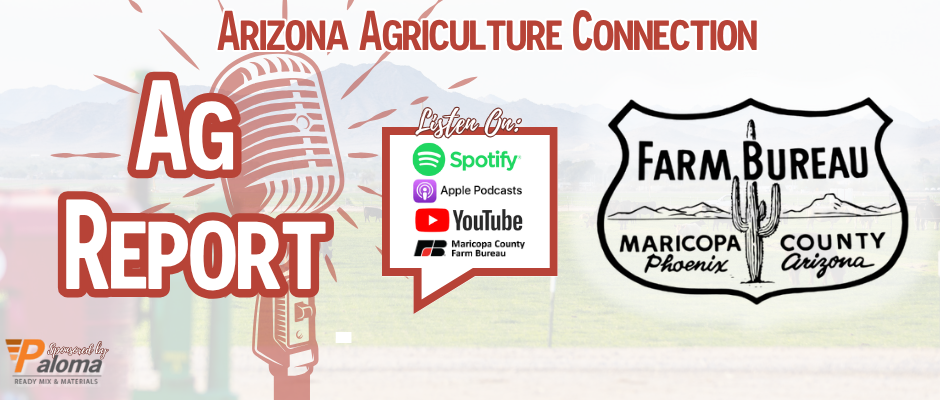Arizona Agriculture Connection Ep. 4-Eric Wilkey
- Nicole Clements

- Feb 21, 2025
- 2 min read
Navigating the Complex Landscape of Agriculture, Exports, and Tariffs in Arizona
Welcome back to the Arizona Agriculture Connection with Maricopa County Farm Bureau. Today, we delve into an insightful discussion with Eric Wilkey, CEO of Arizona Grain. Our conversation covers a broad spectrum of topics, including the significance of export markets, the role of tariffs, and how these factors interplay with Arizona’s vibrant agricultural sector.
Building a strong background within agriculture
Eric Wilkey, a seasoned expert in agriculture, grew up on a grain farm in Illinois. He pursued his education in commodity markets and economics at the University of Illinois, setting the stage for his rich career in agriculture. His journey took him from South Dakota to Minneapolis, and eventually to Arizona, where he has been contributing to the grain industry for over 35 years.
The Importance of Export Markets
Export markets play a vital role in balancing supply and demand within the agricultural sector. Eric emphasizes how export markets help absorb the supply of commodities like wheat and soybeans. Without these markets, domestic demand would falter, leading to an imbalance and reduced price discovery.
For American agriculture, having surplus production allows for price stability and helps maintain a balanced market. The export of surplus crops worldwide influences global prices and aids in providing affordable food supply to disadvantaged regions.
The Arizona Advantage
Arizona’s unique climate and environment offer distinct advantages for agriculture. The state’s consistent sunshine and advanced irrigation techniques allow for stable and predictable production, especially for crops like durum wheat, which is prized around the world. Despite challenges, Eric highlights how Arizona's agricultural diversity ensures resilience and sustainability.
Debunking Myths: Exporting Water
Addressing the controversial topic of “exporting water,” Eric clarifies that all agricultural exports involve the use of water. He argues that this is often misunderstood or sensationalized, as it's a necessary part of agricultural production. Arizona exports not just water, but sunshine, expertise, and efficiency, making significant contributions to both national and global markets.
Impact of Tariffs and Agricultural Markets
Recently, tariffs have become a major headline in national news. Tariffs, fundamentally taxes on imported or exported goods, can significantly disrupt market dynamics. Eric discusses their complex impact, noting that they can benefit some farmers while leaving others at a disadvantage. Understanding these effects is crucial for companies to adapt and maintain competitive market positions.
The future of Arizona’s agriculture is bright. Despite the challenges posed by market dynamics and environmental factors, the resilience and adaptability of Arizona’s farmers remain robust. For anyone doubting the place agricultural production holds in Arizona, Eric encourages exploring rural communities to witness the industry’s vitality firsthand.
Arizona’s agriculture sector is a key component of the state's identity and economy. As both agriculture enthusiasts and stakeholders, we must recognize the critical roles export markets and efficient resource allocation play. Helping foster an understanding of these dynamics will be crucial to driving agriculture forward in Arizona and beyond.
This comprehensive exploration into Arizona’s agricultural sector reveals a field driven by both tradition and innovation, vital for sustaining communities locally and globally.
Join us next week on the Arizona Agriculture Connection, brought to you by the Maricopa County Farm Bureau, as we continue to explore the stories shaping the world of agriculture.





Comments